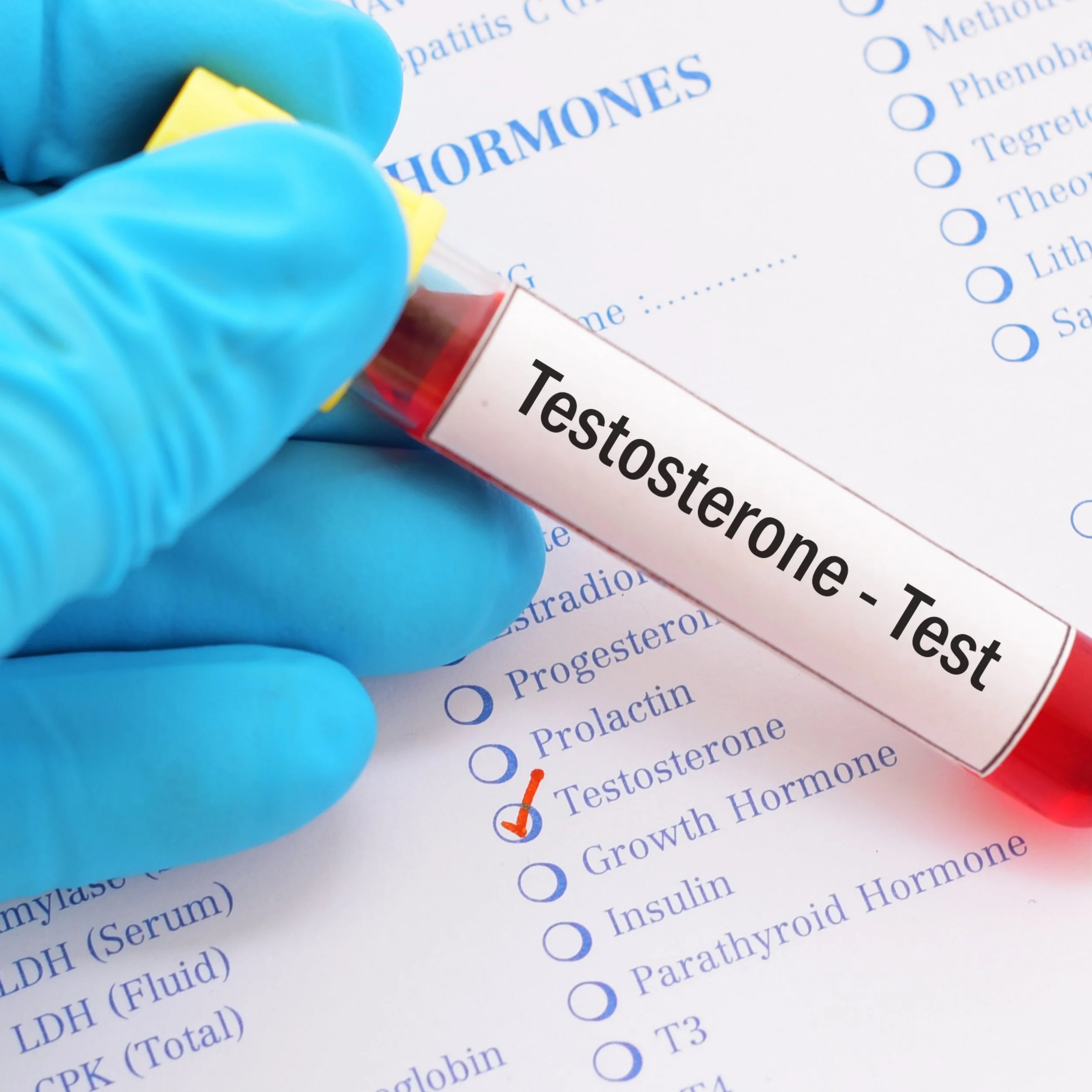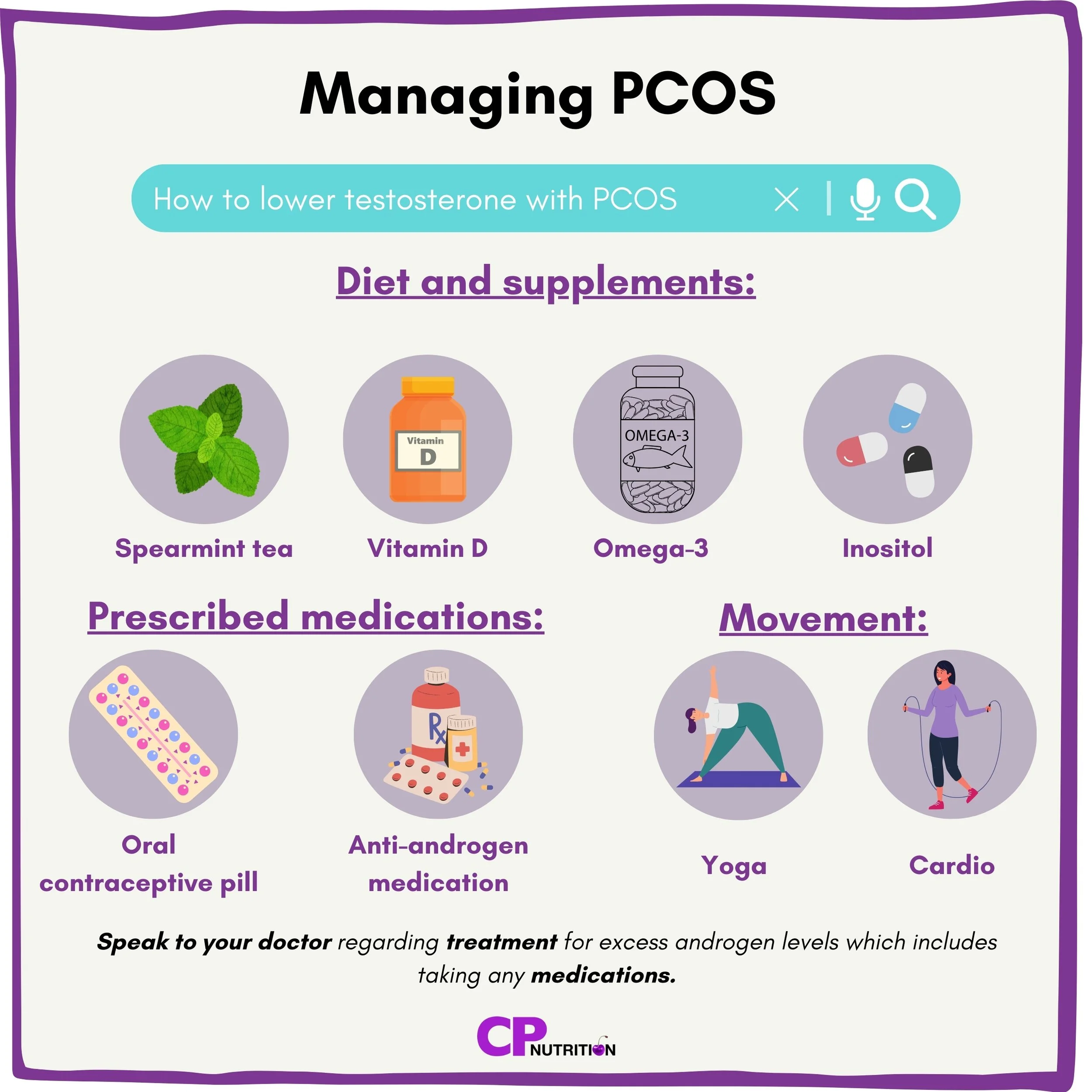How to lower testosterone for PCOS - a nutritionist’s review
PCOS (Polycystic Ovary Syndrome) is a hormone condition that affects how the ovaries work (1). It can cause symptoms such as acne, oily skin, rapid weight gain, irregular periods, difficulty getting pregnant, excess hair growth and hair loss on the head (2). Some of these symptoms can be caused by high levels of testosterone, which is common in women with PCOS.
In fact, one of the three criteria to be diagnosed with PCOS includes the presence of high levels of testosterone in the blood and/or symptoms of having high levels. High levels of testosterone can both cause, and be a symptom of, PCOS and can impact your insulin levels, periods and ovulation (3). So, if you’re wondering how to lower testosterone with PCOS, you’re in the right place. We’ll discuss not only how to know if you have high testosterone but also how to treat high testosterone in PCOS to reduce your individual symptoms.
What is testosterone?
Testosterone is a type of androgen - a hormone that is key in the development of male reproductive tissues as well as promoting sexual characteristics such as increased muscle mass and body hair growth (4). Although testosterone is typically thought of as a male hormone, the female body also naturally produces testosterone in small amounts.
Typical levels of testosterone in PCOS
Although it is normal for women to have testosterone in their bodies, as it is produced in small amounts by the ovaries, generally women produce about 1/10th to 1/20th of the amount of testosterone as men (4). Typical levels of testosterone in men and women are:
Males: 10-30 nmol/L
Females: 0.7-2.8 nmol/L
Females with PCOS: 2.8-5.2 nmol/ L (5)
* note there is no universally agreed cut off range for testosterone levels in PCOS and different clinicians may use different values.
Symptoms of high testosterone
One of the three criteria required in order to be diagnosed with PCOS includes the presence of high testosterone in the blood, which can be seen in a simple blood test and/or symptoms caused by high testosterone. These symptoms might include:
Excessive body hair growth
Loss of hair on the head
Irregular ovulation and menstrual cycles(3)
Acne
PCOS, insulin resistance and testosterone
High levels of insulin, which are commonly seen in women with PCOS, can cause the ovaries to produce excess testosterone which, in turn, can increase insulin levels further, creating a vicious cycle (6,7). Due to this link between high insulin and excess testosterone, it is beneficial to try and manage insulin resistance, often associated with PCOS, in order to reduce testosterone in PCOS. Eating regular, balanced meals and snacks can help to manage insulin resistance. A few tips for balancing your diet include:
Increasing fibre by swapping processed grain products for whole grain alternatives.
Include a source of lean protein, such as chicken, egg, or tofu, in every meal.
Include a source of healthy fats such as fish, nuts or seeds, olive oil or avocado in every meal.
Reduce consumption of sweetened beverages.
Swap highly processed foods which tend to be high in fat, salt & sugar for homemade/less processed alternatives where possible.
A low glycaemic index diet has also been shown to have some benefits in managing insulin resistance.
You may also want to consider implementing regular movement into your week as exercise has also been shown to help reduce insulin resistance (8).
How to treat high testosterone in PCOS?
As well as dietary approaches to managing insulin resistance, there are other strategies which you may wish to try to lower testosterone levels. You can try these one by one, or in combination with one another.
Diet and supplements
Spearmint tea: There is some evidence to suggest that drinking spearmint tea may help with lowering androgen levels. One trial found that drinking two cups of spearmint tea a day for one month lowered free and total testosterone levels in women with PCOS, and in addition the participants' subjective assessment of their excess hair growth was lowered (9). Although more research is required, tea is a low-cost, low-risk intervention therefore could be worth a try if you like mint tea!
Vitamin D supplements should be taken by everyone in the UK during the winter months due to an insufficient level of sunlight (10). But, for PCOS, vitamin D also plays an important role. One study reviewing six trials found that for women with PCOS, supplementing with vitamin D lowered testosterone levels significantly (11).
Omega-3 fats from supplements or from dietary sources such as fish and fish oil, have been seen in some studies to lower testosterone levels in people with PCOS, as well as helping lower inflammation, improve mood and help with egg quality and quantity (12).
Inositol is a vitamin-like substance found in fruits and beans; the body also produces its own in the kidney. There are two types of inositol that are of particular interest to people with PCOS; myo-inositol and d-chiro-inositol, both of which are involved in regulating testosterone production. While the verdict is still out on the optimal supplementation ratio of inositols, one study reviewing Inositol supplementation in 284 women with PCOS, found d-chiro-inositol to be most effective in decreasing total testosterone levels, but states inositol supplementation in both forms is a safe and effective treatment for PCOS symptoms such as acne, excess hair growth or loss of hair on the head (13, 14).
Movement
Whether you opt for a relaxed yoga flow or prefer a higher intensity interval session, research suggests that both forms of movement can be effective in reducing androgen levels in women with PCOS (15, 16). If your routine favours HIIT sessions and cardio, then it may be beneficial to also incorporate some lower intensity mindful movement such as yoga into your exercise regime.
Prescribed medication
The oral contraceptive pill can also help with testosterone levels by reducing the amount of Luteinising Hormone (LH) and Follicle Stimulating Hormone (FSH) produced (5).
Anti-androgen medications (such as spironolactone or cyproterone) are effective for decreasing testosterone levels and alleviating symptoms such as excessive hair growth (17). They work by blocking testosterone receptors, thus relieving the impact of high levels of insulin, or preventing the testosterone from being turned into dihydrotestosterone (a more potent version of testosterone). There are a few different medications available on prescription, therefore you may wish to discuss this with your doctor to see which one is best for you.
Insulin sensitisers can be prescribed by your doctor in order to improve insulin sensitivity, and therein treat high testosterone.
It is important to speak to your doctor regarding treatment for excess androgen levels which includes taking any medications such as insulin-sensitisers, anti-androgens and oral contraceptives to help with symptoms.
While testosterone’s primary function is in the development of masculine features and the male reproductive system, all women also produce a small amount of testosterone. If you have PCOS, the amount of testosterone you produce is likely to be higher than normal, and this is what can cause symptoms such as excessive hair growth, hair loss from the head, oily skin and acne. There are several approaches used to treat high testosterone in PCOS, including dietary interventions, physical movement, and/or supplementation and medication.
Why not try some of the interventions mentioned above to lower testosterone and see what works for you. If you need further support then book a free discovery call to find out more about a 1:1 consultation.
For further information about high testosterone, PCOS, and how to treat high testosterone in PCOS, please visit PCOS Treatment - NHS.
References
Physical Activity, Rather Than Diet, Is Linked to Lower Insulin Resistance in PCOS Women
N-3 fatty acids as preventive and therapeutic agents in attenuating PCOS complications
Inositol is an effective and safe treatment in polycystic ovary syndrome: a systematic review and meta-analysis of randomized controlled trials | Reproductive Biology and Endocrinology


